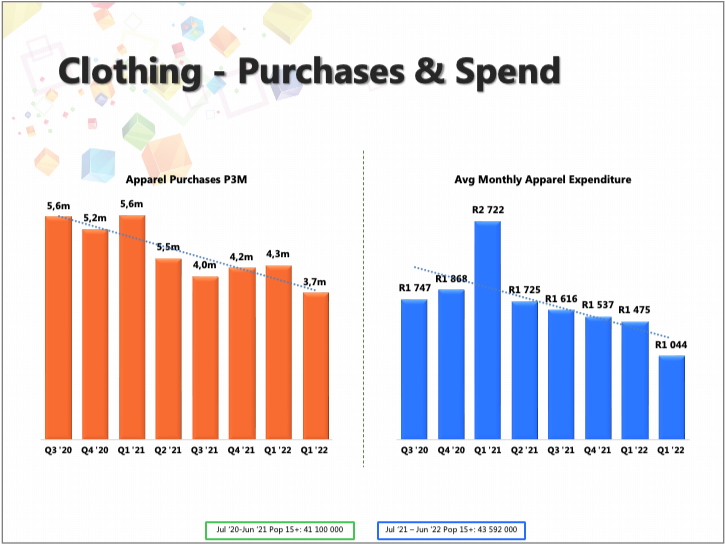The Marketing Research Foundation (MRF) and Plus94 Research announced the successful unveiling of the latest comprehensive MAPS™ (Marketing All Product Survey) dataset through a global webinar presented in partnership with ESOMAR, the world’s leading voice for the data analytics profession.
The MAPS™ May 2024 release incorporated three full years of data from 2021 through 2023, providing brands, marketers and their agency partners with an unmatched opportunity to analyse emerging consumer trends and shifting product purchasing behaviours across South Africa.
 “Our long-standing MAPS program exemplifies the cutting-edge market intelligence capabilities within the South African research community,” said Johann Koster, CEO of the Marketing Research Foundation. “By collaborating with renowned organisations like ESOMAR, we were able to highlight how the quality, integrity and thoroughness of MAPS aligns with the highest global standards for consumer analytics.”
“Our long-standing MAPS program exemplifies the cutting-edge market intelligence capabilities within the South African research community,” said Johann Koster, CEO of the Marketing Research Foundation. “By collaborating with renowned organisations like ESOMAR, we were able to highlight how the quality, integrity and thoroughness of MAPS aligns with the highest global standards for consumer analytics.”
With a robust annual sample size exceeding 20,000 respondents across metro, urban and rural areas, MAPS offers unprecedented visibility into media consumption habits and consumer goods purchasing patterns nationwide. The study’s rigorous methodology, covering over 3 000 brands across more than 150 media and product categories, ensures MAPS data maintains stringent quality thresholds.
Key findings from the MAPS May 2024 release painted a picture of South African households grappling with increasing financial strain amidst rising costs for basic goods and persistent issues like crippling electricity blackouts. Data showed significant declines in expenditures for discretionary purchases like dining out and cinema visits, however alcohol sales have remained fairly constant with beer and wine being increasing consumed. Media consumption remained stable overall, with streaming video and social platforms carving out their space in the video viewing universe while Television seems to have stabilised and is holding its own in terms of overall audience share.
The MAPS May 2024 webinar featured insights into wide-ranging topics such as:
- Impact of escalating inflation on grocery and consumer goods purchasing power
- Shifting habits around traditional and digital media consumption
- Households’ reliance on mobile banking and money transfer services
- Evolution of e-commerce and online shopping adoption across categories like clothing
- Emerging trends in alcoholic beverage preferences and liquor retail channel choices
Koster further emphasised, “The insights derived from MAPS are invaluable for any entity looking to understand and engage with the South African market. Our data is a critical tool for developing strategies that resonate with consumers, drive growth, and adapt to the dynamic market environment.”
The webinar recording and presentation are freely available to all. For more information on accessing these assets, please visit https://mrfsa.org.za/mapspresentations/.
For additional information on MAPS – http://mrfsa.org.za/maps/
Social Media: Facebook – https://www.facebook.com/MRFSouthAfrica/
LinkedIn – https://www.linkedin.com/company/mrfsa




 The MRF’s CEO, Johann Koster says, “The upcoming latest iteration of MAPS will provide insights into consumer behaviour and spending patterns from the first quarter of 2023. It will be interesting to see data from this year coming through.”
The MRF’s CEO, Johann Koster says, “The upcoming latest iteration of MAPS will provide insights into consumer behaviour and spending patterns from the first quarter of 2023. It will be interesting to see data from this year coming through.”


 “The MRF was born as an independent, non-profit company, acting as the custodian and repository of research expertise for the marketing industry and their advertising industry partners,” says MRF’s CEO, Johann Koster. “The MAPS survey has been introduced to fill the void that marketers have been clamouring for.”
“The MRF was born as an independent, non-profit company, acting as the custodian and repository of research expertise for the marketing industry and their advertising industry partners,” says MRF’s CEO, Johann Koster. “The MAPS survey has been introduced to fill the void that marketers have been clamouring for.” The Marketing Research Foundation (MRF) is pleased to announce its quarterly release of the Marketing All Product Survey (MAPS). The next release encompasses nine-month data (July 2020 to March 2021) and will be released towards the end of June 2021 before fieldwork continues for the first full year dataset, set for release in October.
The Marketing Research Foundation (MRF) is pleased to announce its quarterly release of the Marketing All Product Survey (MAPS). The next release encompasses nine-month data (July 2020 to March 2021) and will be released towards the end of June 2021 before fieldwork continues for the first full year dataset, set for release in October.